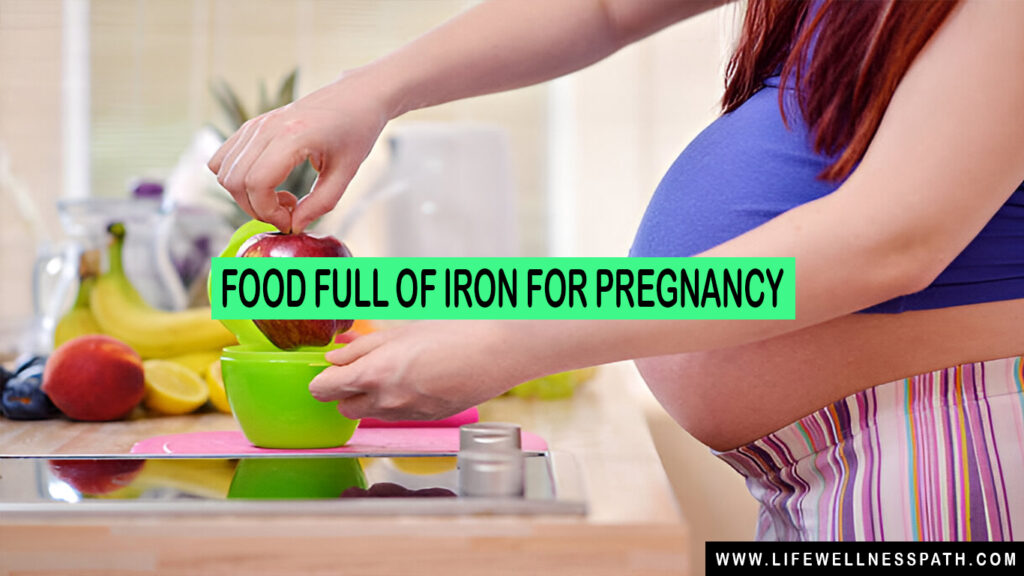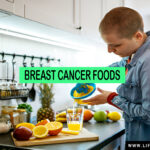Table of Contents
Pregnancy is a beautiful journey filled with excitement, anticipation, and a lot of changes—especially when it comes to nutrition. Among the various nutrients you need, iron plays a crucial role. So, let’s dive into the world of iron-rich foods that are essential for a healthy pregnancy. In this comprehensive guide, we’ll explore everything you need to know about foods full of iron for pregnancy, from understanding iron’s significance to practical tips for incorporating these foods into your daily meals.
Understanding the Importance of Iron in Pregnancy
Why Iron Matters
Iron is a vital mineral that supports many bodily functions, particularly during pregnancy. As your body adapts to accommodate your growing baby, your blood volume increases significantly. This is where iron comes into play—it’s essential for producing hemoglobin, the protein in red blood cells that carries oxygen to your body’s tissues and, most importantly, to your baby.
The Growing Needs
During pregnancy, your iron needs increase to about 27 mg per day, which is nearly double the amount needed for non-pregnant women. This increase helps ensure that both you and your baby have adequate oxygen supply and can support the development of your baby’s organs and systems. So, it’s clear that maintaining healthy iron levels is crucial during this time.

What is Iron?
The Basics of Iron
Iron is a trace mineral that is fundamental to various physiological processes. There are two forms of dietary iron: heme and non-heme. Heme iron, found in animal products, is more readily absorbed by your body. On the other hand, non-heme iron, which comes from plant sources, is less easily absorbed but can still contribute significantly to your daily intake.
Iron’s Role in the Body
Iron not only aids in the formation of hemoglobin but also supports your immune system, helps in energy production, and plays a role in cognitive function. With so much riding on this tiny mineral, it’s essential to ensure you get enough iron-rich foods in your diet during pregnancy.
Why Do Pregnant Women Need More Iron?
The Science Behind It
Pregnant women experience increased blood volume and a growing fetus that requires oxygen and nutrients. As a result, the demand for iron skyrockets. If you’re not meeting these needs through your diet, you may risk developing anemia, which can lead to fatigue, weakness, and other health complications for both you and your baby.
The Impact on Baby’s Development
Iron is critical for your baby’s development, particularly for brain development and the production of red blood cells. Adequate iron intake during pregnancy can even affect your baby’s cognitive abilities later in life. It’s vital to prioritize foods full of iron for pregnancy to ensure your baby gets the best start possible.
Signs of Iron Deficiency in Pregnancy
Recognizing the Symptoms
Are you feeling more fatigued than usual? Do you find it hard to concentrate? These can be signs of iron deficiency. Other symptoms include pale skin, shortness of breath, dizziness, and cold hands and feet. It’s essential to be aware of these signs, especially during pregnancy when your iron needs are heightened.
The Risks of Untreated Deficiency
If left unaddressed, iron deficiency can lead to iron-deficiency anemia, increasing the risk of premature birth, low birth weight, and developmental delays in your baby. By recognizing the symptoms early, you can take action to boost your iron intake through food full of iron for pregnancy.
Consequences of Iron Deficiency for Mother and Baby
Health Implications for You
Iron deficiency anemia can significantly affect your well-being, leading to severe fatigue and a decreased ability to carry out daily tasks. Additionally, it can compromise your immune system, making you more susceptible to infections during pregnancy.
The Impact on Your Baby
For your baby, a lack of iron can result in developmental issues and can even affect their health after birth. Babies born to mothers with low iron levels are at risk for anemia themselves, which underscores the importance of ensuring adequate iron intake throughout pregnancy.
Animal-Based Iron Sources
The Power of Heme Iron
When it comes to iron-rich foods, animal products are your best friend, particularly heme iron sources. Red meat, poultry, and fish are excellent options that provide easily absorbable iron. Beef, for example, is not only rich in iron but also packed with protein, zinc, and B vitamins—nutrients that support overall health during pregnancy.
Incorporating Meat into Your Diet
Incorporating these animal-based sources into your meals can be simple. Think about lean cuts of beef in stir-fries, grilled chicken salads, or baked salmon. Not only do these meals deliver the iron your body craves, but they also offer a variety of flavors and nutrients essential for both you and your growing baby.
Poultry: A Versatile Source of Iron
Chicken and Turkey Benefits
When we think of iron-rich foods, poultry might not come to mind immediately, but chicken and turkey are excellent sources of non-heme iron. These meats are also lower in fat than red meat, making them a healthier choice for many pregnant women.
Delicious Ways to Enjoy Poultry
You can easily incorporate poultry into your diet by enjoying grilled chicken in salads, turkey in sandwiches, or chicken stir-fries. The versatility of poultry makes it a great option for many meals, ensuring you get your needed iron without sacrificing taste.
Fish: Omega-3s and Iron Combined
The Benefits of Fish
Fish is another fantastic source of iron, particularly fatty fish like salmon and sardines. Not only do these fish provide good amounts of iron, but they are also rich in omega-3 fatty acids, which are crucial for your baby’s brain development.
Making Fish a Staple
Aim to include fish in your diet a couple of times a week. Whether it’s a grilled salmon filet, a tuna salad, or sardines on toast, there are plenty of delicious ways to enjoy fish while boosting your iron intake.
Legumes: Beans and Lentils for Iron
The Power of Plant-Based Iron
Legumes, such as lentils, chickpeas, and beans, are excellent sources of non-heme iron. These foods are not only packed with iron but also offer fiber, protein, and various vitamins and minerals, making them a well-rounded addition to your diet.
Creative Ways to Enjoy Legumes
Incorporating legumes into your meals can be as easy as adding lentils to soups, chickpeas to salads, or beans to burritos. The possibilities are endless, and these foods can be flavorful and satisfying.
Leafy Greens: Spinach and Kale
A Nutrient Powerhouse
Leafy greens are often hailed as superfoods, and for a good reason. Spinach, kale, and Swiss chard are all rich in iron and packed with vitamins A, C, and K. Plus, they’re low in calories, making them a great addition to any meal.
Adding Greens to Your Diet
Think about including leafy greens in your daily meals. You can add spinach to smoothies, make kale chips, or toss some Swiss chard into stir-fries. The more creative you get, the more you’ll enjoy these nutritious veggies!
Nuts and Seeds: Snackable Iron Boosters
Iron-Rich Nuts and Seeds
Nuts and seeds are not only convenient snacks but also fantastic sources of non-heme iron. Almonds, cashews, pumpkin seeds, and sunflower seeds are particularly high in iron and can easily be added to various dishes.
Easy Ways to Incorporate Them
Enjoy a handful of mixed nuts as a snack, sprinkle seeds over your salad, or blend them into smoothies. These small additions can make a big difference in your overall iron intake while satisfying your snack cravings.
Whole Grains: Quinoa and Oats
Whole Grains for Health
Whole grains like quinoa, brown rice, and oats are not only good sources of iron but also provide fiber, B vitamins, and essential minerals. Quinoa, in particular, is a complete protein, making it an excellent choice for vegetarians and vegans.
Creative Whole Grain Meals
Consider making a hearty quinoa salad, overnight oats, or brown rice bowls filled with veggies. These meals are not only nutritious but also incredibly filling and satisfying.
Fortified Cereals: A Convenient Iron Source
The Benefits of Fortified Foods
Many breakfast cereals are fortified with iron, making them an easy way to boost your iron intake. When choosing cereals, look for those that offer at least 18 mg of iron per serving.
Enjoying a Nutritious Breakfast
Pair your fortified cereal with a glass of orange juice to enhance iron absorption. Adding fruits or nuts can also create a more balanced breakfast that keeps you energized throughout the morning.
Dried Fruits: Sweet and Iron-Rich
The Sweet Side of Iron
Dried fruits like apricots, figs, and raisins are not only delicious but also rich in iron. They make for great snacks and can be added to various dishes to boost their nutritional content.
Using Dried Fruits Creatively
Incorporate dried fruits into your salads, oatmeal, or snack mixes. They can add a natural sweetness while contributing to your iron intake—just be mindful of portion sizes, as they are calorie-dense.
Creating Balanced Meals with Iron in Mind
Meal Planning Essentials
When planning meals, it’s essential to consider balance. Aim to include a source of protein, whole grains, and plenty of fruits and vegetables in each meal. This approach will help you meet your iron needs while ensuring you get a variety of nutrients.
Sample Meal Ideas
Think about starting your day with oatmeal topped with dried fruit and nuts. For lunch, try a quinoa salad with chickpeas, spinach, and a citrus dressing. Dinner could be grilled salmon with roasted sweet potatoes and steamed kale. These meals are not only iron-rich but also delicious!
Cooking Techniques that Enhance Iron Absorption
Cooking with Iron in Mind
Certain cooking techniques can help enhance iron absorption. For example, cooking in cast iron pots can increase the iron content of your food, particularly acidic foods like tomatoes.
Pairing Foods for Better Absorption
Pairing iron-rich foods with vitamin C sources—like bell peppers, citrus fruits, and broccoli—can significantly enhance iron absorption. So, don’t hesitate to toss some veggies into your meals!
Avoiding Iron Blockers
Foods that Inhibit Iron Absorption
Certain foods can inhibit iron absorption, so it’s important to be aware of them. Calcium-rich foods, coffee, tea, and high-fiber foods can all hinder the body’s ability to absorb iron.
Timing is Key
To maximize iron absorption, consider timing your meals. For instance, try to enjoy your tea or coffee between meals rather than during, and space out calcium-rich foods from iron-rich meals.
Supplements: When to Consider Them
Knowing When to Supplement
While getting iron from food is ideal, some pregnant women may need supplements to meet their iron needs. If you’re experiencing symptoms of deficiency or if your healthcare provider recommends it, a supplement may be necessary.
Choosing the Right Supplement
If you decide to take an iron supplement, choose one that is gentle on your stomach. Discuss your options with your healthcare provider to find the best fit for your needs.

Consulting with Healthcare Providers
The Importance of Professional Guidance
As you navigate your pregnancy journey, consulting with healthcare providers is essential. They can provide tailored advice on your iron needs and help you create a nutrition plan that works for you.
Regular Check-Ups Matter
Don’t skip those prenatal appointments! Regular check-ups can help monitor your iron levels and overall health, ensuring that you and your baby are getting what you need for a healthy pregnancy.
Iron-Rich Recipes for Expecting Moms
Easy and Delicious Meals
Ready to start cooking? Here are a few easy iron-rich recipes to try:
- Chickpea Salad: Combine canned chickpeas, diced bell peppers, red onion, and a squeeze of lemon juice. Serve chilled for a refreshing meal packed with iron.
- Spinach and Feta Omelets: Whisk together eggs, stir in chopped spinach and crumbled feta cheese, and cook in a non-stick skillet for a delicious breakfast full of nutrients.
Savory Snacks
Try making energy balls using oats, nut butter, and dried fruits for a quick snack packed with iron. These are great for on-the-go moms!
Incorporating Iron into Your Daily Routine
Making Iron a Habit
To ensure you’re meeting your iron needs, try planning your meals in advance. Create a shopping list focused on iron-rich foods, and make a habit of including them in your diet daily.
Fun Ways to Remember
Consider setting reminders on your phone or keeping a food diary. Tracking what you eat can help you stay mindful of your iron intake and ensure you’re making the best choices for you and your baby.
The Role of Hydration in Iron Absorption
Don’t Forget to Stay Hydrated
While focusing on iron intake, don’t overlook hydration! Staying hydrated is vital for overall health during pregnancy and can also aid in the absorption of nutrients, including iron.
Water: The Best Choice
Aim to drink plenty of water throughout the day. Herbal teas or infused waters with fruits can add variety while keeping you hydrated and refreshed.
Celebrating Your Progress
Acknowledge Your Journey
As you focus on improving your iron intake, take a moment to celebrate your progress. Whether it’s trying a new recipe or discovering a new favorite food, every small step counts!
Share with Loved Ones
Consider involving your partner or family in your journey. Cooking together can make the process more enjoyable and keep everyone informed about healthy choices.
Creating a Supportive Environment
Surrounding Yourself with Support
Having a support system during your pregnancy can make a significant difference. Share your goals with friends and family, and encourage them to join you in making healthy choices.
Joining a community
Consider joining a pregnancy group or online forum. Connecting with other expecting moms can provide encouragement, share experiences, and help you stay motivated.
Embracing the Journey
The Beauty of Pregnancy
Pregnancy is a unique and transformative experience. By focusing on your nutrition and incorporating foods full of iron for pregnancy, you’re not only nourishing yourself but also giving your baby the best start possible.
A Healthy Future Ahead
With the right information and support, you can navigate your pregnancy with confidence. Keep exploring new recipes, enjoying nutritious foods, and celebrating the joys of this incredible journey.
Read More: 10 Amazing Benefits of Real Food for Pregnancy: Nourishing You and Your Baby Naturally
FAQs on Food Full of Iron for Pregnancy
- What food is high in iron for being pregnant?
- Foods like spinach, pork, lentils, and fortified cereals are notable resources of iron for pregnant ladies.
- What liquids are high in iron for being pregnant?
- Iron-rich liquids encompass fortified orange juice, beet juice, and natural teas crafted from nettle or dandelion.
- Which fruit is wealthy in iron?
- Dried culmination, especially apricots, prunes, and raisins, are wealthy in iron and splendid for pregnant girls.
- What food is maximum in iron?
- Organ meats, which includes liver, contain the highest amounts of iron per serving in comparison to different meals.
- How a good deal iron does pregnant ladies need each day?
- Pregnant ladies usually need approximately 27 mg of iron according to day to help the developing fetus.
- Are beans a very good supply of iron for pregnancy?
- Yes, beans like kidney beans, chickpeas, and black beans are brilliant plant-based totally sources of iron.
- Is pork useful for iron ranges all through being pregnant?
- Absolutely! Red meat is one of the richest sources of heme iron, which is extra easily absorbed by means of the frame.
- Can I get enough iron from a vegetarian eating regimen throughout pregnancy?
- Yes, vegetarians can meet their iron desires by way of consuming lots of plant-based totally iron assets and pairing them with nutrition C-rich ingredients for higher absorption.
- What are some iron-fortified cereals for being pregnant?
- Many cereals are fortified with iron, which include oatmeal, cream of wheat, and bran flakes. Check the labels for particular iron content material.
- Are nuts high in iron for pregnant ladies?
- Nuts, specifically almonds and cashews, contain iron and are a healthful snack option all through pregnancy.
- What greens are wealthy in iron?
- Dark leafy veggies like spinach, kale, and collard vegetables are terrific sources of iron for pregnant girls.
- Is chocolate a great source of iron?
- Dark chocolate carries a few irons and may be loved sparsely as a part of a balanced eating regimen.
- Should I keep away from dairy merchandise for iron absorption?
- While dairy merchandise is wholesome, they can inhibit iron absorption if ate up in huge quantities with iron-rich food.
- Can I take iron supplements at some point of being pregnant?
- Yes, iron dietary supplements may be taken if recommended by your healthcare issuer, in particular if nutritional consumption is insufficient.
- What role does nutrition C play in iron absorption?
- Vitamin C enhances the absorption of non-heme iron from plant sources, so pairing iron-rich foods with vitamin C-wealthy foods is useful.
- Are eggs a good source of iron at some stage in pregnancy?
- Yes, eggs contain iron, in the main within the yolk, and may be protected in a wholesome pregnancy diet.
- What is the difference among heme and non-heme iron?
- Heme iron, determined in animal merchandise, is extra effortlessly absorbed by means of the body than non-heme iron, that is discovered in plant-based totally meals.
- Can iron-wealthy meals assist prevent anemia during being pregnant?
- Yes, consuming iron-wealthy ingredients can assist prevent anemia, a not unusual situation throughout being pregnant because of multiplied blood volume.
- How can I beautify iron absorption from food?
- Pair iron-rich meals with sources of vitamin C and keep away from calcium-wealthy foods across the equal time to enhance absorption.
- What is a few iron-rich snack thoughts for pregnant girls?
- Snack ideas encompass hummus with carrot sticks, trail blend with nuts and dried fruits, and entire grain crackers with turkey.
- Is seafood an amazing supply of iron all through pregnancy?
- Certain seafood, like clams and oysters, are excessive in iron and can be effectively consumed at some point of being pregnant.
- Can I get too much iron in the course of being pregnant?
- Yes, excessive iron intake can result in complications. It’s crucial to stick to endorsed dietary allowances until suggested otherwise by a healthcare company.
- What is some brief iron-wealthy meal ideas for busy pregnant ladies?
- Quick meal ideas include stir-fried tofu with greens, quinoa salad with chickpeas, and a smoothie with spinach and fortified almond milk.
- What spices can boost iron intake during being pregnant?
- Spices like thyme, cumin, and paprika can add flavor to dishes and provide a few extra irons.
- How can I make certain I’m assembly my iron wishes during being pregnant?
- Keep music of your food, encompass a number of iron-wealthy meals, and visit your healthcare company for steering.
- Are candy potatoes high in iron?
- Sweet potatoes comprise some iron and are also wealthy in other nutrients, making them a wholesome addition on your weight-reduction plan.
- What are some recipes that encompass iron-rich meals?
- Recipes like lentil soup, spinach-filled chook, and quinoa salad with beans are scrumptious alternatives packed with iron.
- Can I devour iron-wealthy foods if I even have meals sensitivities?
- Yes, many iron-rich ingredients can accommodate food sensitivities, inclusive of gluten-unfastened grains and legumes.
- What are the signs and symptoms of iron deficiency for the duration of being pregnant?
- Symptoms include fatigue, weakness, light pores and skin, and dizziness. If you enjoy those, seek advice from your healthcare provider.
- When need to I get my iron tiers checked at some point of being pregnant?
- Regular check-U.S. For the duration of pregnancy will generally encompass monitoring iron levels, specifically for the duration of the second one and third trimesters.







